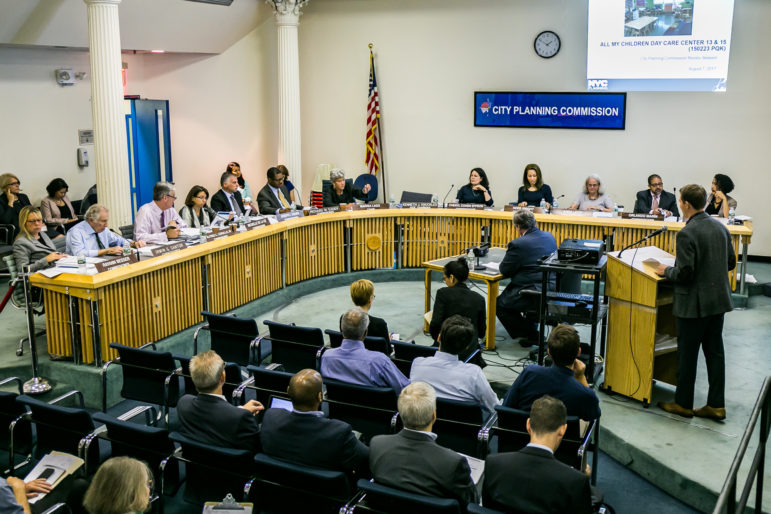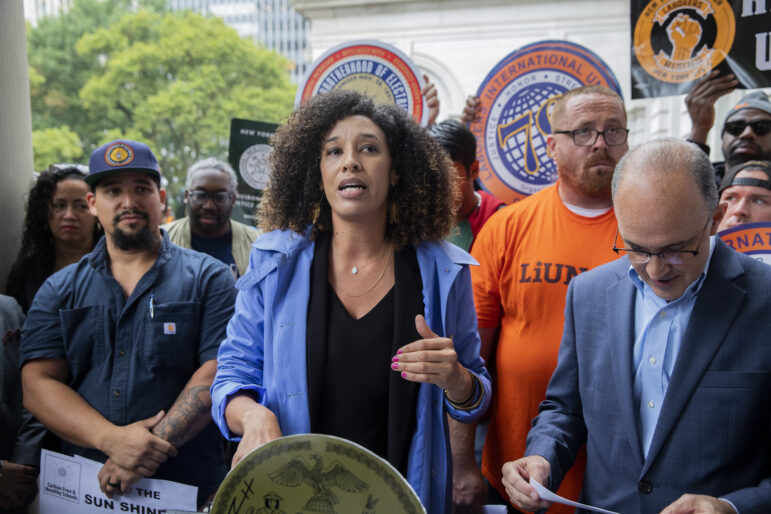Spring comes earlier to Washington. It may be chilly here, but plenty of New Yorkers are enjoying the cherry blossoms – if they have a free minute – in the nation’s capital, as the Obama administration has invited in many locals. And they’ve heeded the call.
State Labor Commissioner M. Patricia Smith awaits confirmation by the U.S. Senate as the new solicitor – the #3 position – at the U.S. Department of Labor. Smith, who was nominated for the position last month, has earned accolades for her aggressive enforcement of wage and overtime violations by employers for low-wage workers. She would not be a stranger to the Obama administration, as she served as a member of the president’s transition team for the labor department.
Other city folk who will be spending more time in D.C. include Dr. Neil Calman, the president and CEO of New York’s Institute for Family Health, and Scott White, assistant director of the 1199 SEIU Training and Employment Fund, who were appointed this month to a Health Information Technology Policy Panel with 13 members representing various categories. Calman is the “expert in improving the health of vulnerable populations” and White is from the “labor organization representing health care workers.”
The heads of two national nonprofit groups with a prominent presence in New York City also were named to the President’s new Advisory Council on Faith-Based and Neighborhood Partnerships. Public/Private Ventures president Fred Davie, who is leaving his post for a top spot at the Arcus Foundation, and Diane Baillargeon, the president and CEO of Seedco, will sit on the council, which aims to provide resources to both secular and religious nonprofit groups.
The naming of Baillargeon to the president’s advisory council was not the only development at her organization, as Lesia Bates-Moss, who had served as a vice president and head of the counterparty risk management office at Fannie Mae for three years, joined the nonprofit in the dual roles of executive vice-president and president of Seedco Financial.
These announcements come on the heels of the marquee moves to the capital: The appointment of Bronx Borough President Adolfo Carrion to lead the new White House office of Urban Affairs, and of Department of Housing Preservation and Development head Shaun Donovan – who made his mark in five years as commissioner – to become Secretary of the Department of Housing and Urban Development. Rafael Cestero, who had been senior vice president and chief program officer for the national nonprofit Enterprise Community Partners, was named Donovan’s successor as commissioner in March. Assemblyman Ruben Diaz Jr. is angling to become Bronx beep in the special election set for April 21. Meanwhile, Kirsten Gillibrand‘s new seat in the U.S. Senate has caused a few changes, including Elana Broitman‘s departure from directing city and public affairs with UJA-Federation to working as a legislative assistant, advising the junior senator from New York on foreign affairs.
In Albany, Andrew Stengel, a leading critic of the capital’s “dysfunction,” has headed north to try to make change from the inside. Until recently the national election advocacy director at NYU’s Brennan Center for Justice, Stengel has joined the State Senate’s majority conference as a senior policy advisor for government reform. He’ll help to draft a report on administration and rules reform that is expected to come out in the next few weeks. “We are looking forward to bringing in a new era of openness, accountability and transparency to state government, and Andrew is going to be a key part of that,” senate majority conference spokesman Austin Shafran told City Limits.
Political developments in New York City also impacted local policy think tank the Drum Major Institute, as its executive director for six years, Andrea Batista Schlesinger went on leave in February to serve as a policy advisor and strategist for Mayor Bloomberg’s re-election campaign. In her absence, Mark Winston Griffith, a DMI senior fellow on issues of economic justice (and board member of City Limits’ parent nonprofit, City Futures, Inc.), will assume the duties of executive director.
Outside the campaign, Mayor Bloomberg has done his fair share of appointing in 2009, naming Maryanne Schretzman, deputy commissioner for policy and planning at the Department of Homeless Services, to the post of Family Services Coordinator for the city. Schretzman replaced Ronald E. Richter, who has gone on to become a judge in the city’s Family Court – and was replaced at DHS by Ellen Howard-Cooper, who had been deputy commissioner for prevention services.
This month, Bloomberg also appointed lawyer William J. Hibsher and Queens Public Television journalist Renee Lobo to the city’s Commission on Human Rights. At the independent Civilian Complaint Review Board, Ernest F. Hart was appointed to serve as board chairman of the body that reviews complaints about the NYPD. Hart comes to the CCRB from the Harlem hospital center at Columbia University, where he serves as an associate dean and chief operating officer. He replaces Franklin H. Stone, who has been a board member since 2006.
Several officials also began settling into newly created NYC posts at the start of this year. Michael Colgrove was promoted, from senior project manager in residential efficiency and affordability, to the new position of New York City Director for Energy Programs with the state’s Energy Research and Development Authority (NYSERDA). Dr. Christine Cea was elected to the New York State Board of Regents to represent the newly expanded judicial district of Staten Island and began her duties in April. Longtime New York City education advocate Dr. Merryl Tisch was elected to serve as chancellor of the board in March.
Several nonprofit groups have named new people to chair their boards of trustees. William H. Taft IV, a lawyer and professor who has served as an advisor to several presidential administrations, was named as the board of trustees chairman for Freedom House in January, replacing Peter Ackerman. Advancing civic design in a new way will be David Childs, a consulting partner at the renowned architectural firm Skidmore, Owings & Merrill, who became chairman of the board for the influential Municipal Art Society. Childs replaces Philip K. Howard, who served as chairman for 10 years. Howard will stay on with the society as a member of the board.
The nonprofit world has seen plenty of other moves in recent months. Children’s Aid Society CEO C. Warren Moses announced his retirement from the group in February, to take effect at the end of the year. By the time he retires, Moses will have served as CEO of the society for four years and will have fittingly capped a 40-year career at the agency that began in 1969. Also at the Society, Katherine Eckstein, a policy and advocacy specialist there, recently became the director of public policy.
Arva Rice, the former executive director of the microfinance group Project Enterprise, will begin her new position as CEO of the New York Urban League in mid-April. Rice replaces Darwin Davis as CEO, who had served as head of the league for five years. Catherine Barnett, Project Enterprise’s current vice president, will serve as interim executive director in the meantime. At the North Star Fund, a nonprofit funder that provides grants around social justice issues, Diana Correa was named to the newly created position of deputy director for programs and strategic initiatives in January after serving as the Northeast regional director for the nonprofit Hispanics in Philanthropy.
The Association for Neighborhood and Housing Development and the New York Immigrant Coalition created the Center for Neighborhood Leadership in conjunction with support from JP Morgan Chase to support the work of aspiring community organizers through a 10-month apprenticeship program. Hector Soto, a former senior fellow with the National Institute for Latino Policy, was tapped to head the center early this year. At the homeless advocacy group Picture the Homeless, Joe Catron took over as an organizer for the Housing Not Warehousing campaign. Catron replaced Sam Miller in that role, but Miller with PTH as a lead organizer.
In the area of criminal justice advocacy, Annie Salsich became the director of the Vera Institute for Justice’s Center on Youth Justice after having served as an associate director at the center for three years. Salsich replaces Sara Mogulescu, who went on to work as a senior consultant with Bennett Midland LLC.
There were also two prominent appointments at nonprofit groups that focus on workforce development and employment issues for underserved populations. Christine McMahon became the executive director and CEO of Fedcap Rehabilitation Services in February, replacing Susan Fonfa who had served in that capacity since 1994. McMahon comes to Fedcap from the Northeastern affiliate for Easter Seals. For her part, Fonfa has gone on from Fedcap to Southern Illinois University, where she will be a visiting assistant professor in the psychiatry department. And Jill Poklemba became the director of communications and development at STRIVE New York in March after having served as a senior policy analyst on income security and workforce development with the Federation of Protestant Welfare Agencies. Poklemba was replaced at the federation by Liz Accles, who serves as a senior policy analyst for income security and early childhood education at the federation.
Catholic Charities Community Services for the Archdiocese of New York has a new executive director in Beatriz Diaz Taveras. She took over for longtime Catholic Charities official Monsignor Kevin Sullivan, who has gone on to take the post of executive director for Catholic Charities itself.
At the youth services nonprofit Covenant House New York, Jerome Kilbane took over as executive director in January after coming to New York from Covenant House Pennsylvania. Kilbane replaced Bruce Henry, who was with Covenant House New York for 24 years before taking a new post as director of the Covenant House Institute.
At Medgar Evers College, the search for a new president is on. Dr. Edison O. Jackson announced he will retire in August, after 20 years as president of the CUNY college in Brooklyn.








